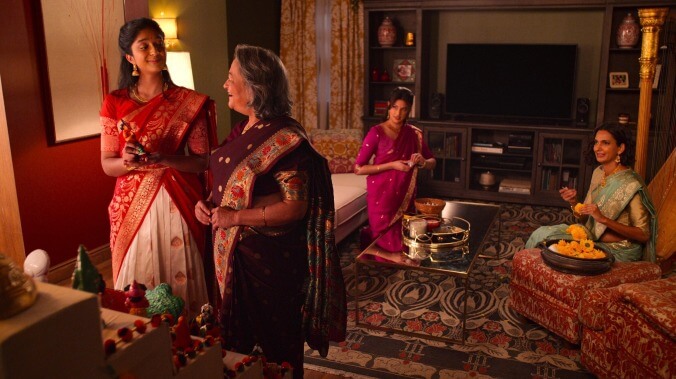Never Have I Ever has never been better
In season three, Mindy Kaling's coming-of-age comedy cements itself as one of Netflix's most entertaining and heartfelt shows

Teen TV comedies are always a crowded genre, with Netflix contributing a fair share of young-adult originals over the last few years, from Sex Education to On My Block to Atypical. While it’s tough to stand out in this space, Mindy Kaling’s sparkling Never Have I Ever retains its charm three seasons in, offering 10 new episodes that continue to build on the fresh nuances of its breezy coming-of-age story. If you’re a fan of Kaling’s work on The Office, The Mindy Project, or The Sex Lives Of College Girls, you need to get on board. Devi Vishwakumar’s (Maitreyi Ramakrishnan) quest for popularity is full of lighthearted humor, pop culture riffs, and witty banter in the vein of those shows.
But it goes deeper than that: the series’ heart actually lies in how it adeptly tackles Devi’s grief after her father’s sudden demise and the intergenerational dynamics of her Indian-immigrant family. NHIE finely balances the dual act of being riotous and emotionally resonant without being saccharine or over-the-top ridiculous, a real testament to both the writers’ room and Ramakrishnan, who tethers the show with a stellar leading performance. On the surface, Devi often seems unlikable because she’s a flawed, selfish character who feels too much and is going through an identity crisis. But Ramakrishnan’s spirited and poignant turn grounds Devi’s antics, making it easy to root for her even when her actions may not deserve it.
The actor mines new depths for Devi this time around as she finds herself in an unexpected position of power: she’s finally dating the hot jock of her dreams, Paxton Hall-Yoshida (Darren Barnet). Through this twist of fate, NHIE examines what it means to have self-confidence and trust in yourself instead of placing it solely on the fantasy of another person or relationship. Devi has been a nerd her whole life, so the sudden attention (which she’s always craved, by the way) understandably leads to insecurities bubbling up. If we know one thing for certain, it’s that she attracts drama, the kind that might not be suitable for her new boyfriend.
What happens when you get everything you thought you always wanted? The answer is never linear, not even for someone as sure of her desires as Devi. Luckily, NHIE emphasizes her evolution, and it’s a welcome change of pace to witness how she matures with the curveballs thrown her way, whether romantic, academic, or familial. Devi and Paxton’s exciting relationship faces challenges in the form of internet trolls, his exes, her frenemy Ben Gross (Jaren Lewison)—who is clearly still in capital-L love with her—and newcomer Nirdesh, a.k.a. Des (Anirudh Pisharody). That’s right, folks, Devi’s love triangle balloons into a square. But despite these troubles, no one is pigeonholed with limited descriptors. Paxton, Ben, and all of Devi’s close friends find moments of growth. It’s a treat to see all the characters get so fully fleshed out, further aided by a talented ensemble settled well into their roles by now.
The focus on Devi’s romances and friendships keeps the fun rolling, but NHIE also dwells on her home life and family members by giving them just enough screen time. Although, to be honest, season three could’ve definitely used more Nalini (Poorna Jagannathan, always a goddamn scene-stealer). Devi’s strict but loving mother is still reeling from Mohan’s (Sendhil Ramamurthy) loss, and luckily, there’s nary a mention of season two’s boring love interest played by Common. Instead, she finds respite in a new friend, Rhyah (Sarayu Blue), after it was correctly pointed out she lacks a social group.
Meanwhile, cousin Kamala (Richa Moorjani) is on a quest for independence and starts dating Devi’s school teacher, Manish (Ghosts’ Utkarsh Ambudkar), much to the chagrin of her grandmother, Nirmala (Ranjita Chakravarty). It leads to a slightly toxic push-and-pull between them that provides necessary commentary on the age-old cliché of arranged marriages bestowed on South Asian characters. It’s a bit jarring not getting an update on Kamala’s professional successes since season two spent a lot of time with her in the lab, but her character development still works.
To its credit, NHIE succeeds at portraying various dimensions of South-Asian culture and lifestyle (Kaling’s personal experiences help influence the show, while the inclusive cast and crew tell stories rarely seen onscreen) without making them the defining traits of the Vishwakumars. Even tennis star John McEnroe’s voiceover for Devi starts feeling more familiar instead of just random. (To his credit, McEnroe is a pointedly comical narrator.) In the end, Never Have I Ever offers a rambunctious good time in a sea of bad-to-average Netflix originals. The show is going to end with its upcoming fourth season (set up perfectly by the end of this third one), but its legacy is already cemented as one of the streamer’s most entertaining and heartfelt offerings to date.